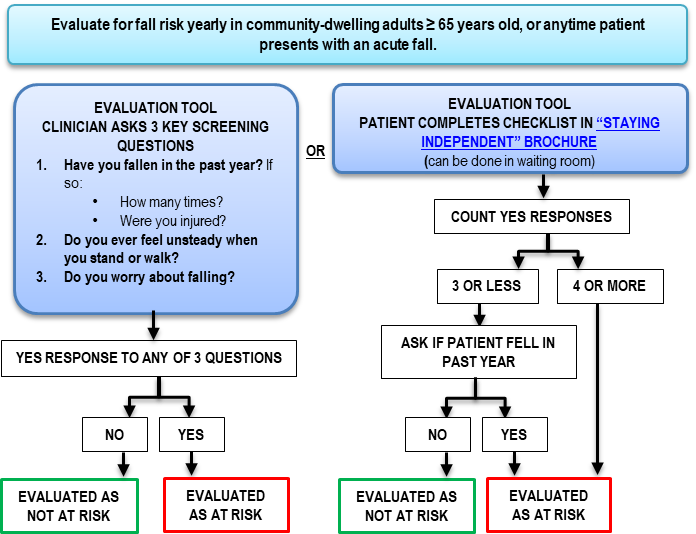Not known Facts About Dementia Fall Risk
Not known Facts About Dementia Fall Risk
Blog Article
Not known Factual Statements About Dementia Fall Risk
Table of ContentsThe Main Principles Of Dementia Fall Risk Facts About Dementia Fall Risk RevealedDementia Fall Risk Fundamentals ExplainedDementia Fall Risk Things To Know Before You Get ThisHow Dementia Fall Risk can Save You Time, Stress, and Money.
Evaluating autumn danger assists the whole health care group create a safer environment for each patient. Guarantee that there is a designated location in your clinical charting system where team can document/reference scores and record relevant notes related to drop avoidance. The Johns Hopkins Loss Threat Evaluation Tool is one of numerous tools your staff can use to assist protect against damaging clinical events.Client drops in hospitals are common and devastating negative events that persist regardless of decades of effort to reduce them. Improving communication throughout the examining registered nurse, care team, client, and patient's most entailed loved ones may reinforce autumn prevention efforts. A group at Brigham and Women's Medical facility in Boston, Massachusetts, looked for to establish a standardized autumn prevention program that focused around improved interaction and person and family involvement.

The innovation group stressed that effective application relies on individual and team buy-in, assimilation of the program right into existing workflows, and fidelity to program procedures. The team noted that they are facing just how to make sure continuity in program implementation throughout durations of crisis. During the COVID-19 pandemic, for instance, a boost in inpatient falls was linked with constraints in patient engagement in addition to limitations on visitation.
Dementia Fall Risk - An Overview
These events are typically taken into consideration avoidable. To apply the intervention, companies need the following: Access to Autumn pointers resources Loss TIPS training and re-training for nursing and non-nursing personnel, consisting of new nurses Nursing operations that allow for person and family interaction to conduct the falls analysis, ensure use the prevention strategy, and carry out patient-level audits.
The outcomes can be very damaging, often speeding up patient decline and causing longer hospital stays. One study approximated keeps raised an added 12 in-patient days after a client fall. The Autumn TIPS Program is based upon interesting clients and their family/loved ones throughout 3 major procedures: assessment, customized preventative interventions, and auditing to make sure that people are taken part in the three-step autumn prevention process.
The client evaluation is based upon the Morse Loss Range, which is a validated fall risk assessment device for in-patient medical facility settings. The scale consists of the six most common factors individuals in health centers fall: the patient autumn history, high-risk problems (consisting of polypharmacy), usage of IVs and various other exterior tools, psychological standing, gait, and movement.
Each danger aspect relate to several workable evidence-based treatments. The nurse produces a plan that incorporates the interventions and shows up to the care team, client, and household on a laminated poster or published aesthetic aid. Registered nurses create the strategy while meeting with the patient and the click here to read patient's family.
All about Dementia Fall Risk
The poster functions as an interaction tool with various other participants of the patient's care team. Dementia Fall Risk. The audit part of the program includes evaluating the individual's knowledge of their threat aspects and prevention strategy at the system and healthcare facility levels. Registered nurse champions conduct a minimum of five specific interviews a month with people and their households to examine for understanding of the fall avoidance plan

A projected 30% of these falls outcome in injuries, which can range in intensity. Unlike other negative events that call for a standardized clinical action, fall avoidance depends highly on the demands of the individual.
How Dementia Fall Risk can Save You Time, Stress, and Money.

Based upon auditing outcomes, one site had 86% conformity and 2 sites had over 95% conformity. A cost-benefit analysis of the Fall ideas program in 8 medical facilities approximated that the program expense $0.88 per client to apply and led to cost look at here now savings of $8,500 per 1000 patient-days in straight expenses connected to the avoidance of 567 falls over 3 years and eight months.
According to the innovation group, companies interested in executing the program must conduct a readiness analysis and drops avoidance voids analysis. 8 Additionally, organizations should make sure the needed framework and workflows for application and establish an execution plan. If one exists, the organization's Fall Prevention Job Pressure must be involved in planning.
The smart Trick of Dementia Fall Risk That Nobody is Talking About
To start, companies should guarantee completion of training modules by registered nurses and nursing aides - Dementia Fall Risk. Hospital staff ought to evaluate, based on the requirements of a health center, whether to use an electronic health record printout or paper variation of the autumn prevention plan. Implementing teams should hire and educate registered nurse champs and develop procedures for bookkeeping and reporting on autumn data
Personnel need to be associated with the process of redesigning the process to engage people and household in the evaluation and prevention plan process. Solution ought Learn More Here to be in place so that units can understand why a loss took place and remediate the reason. A lot more particularly, nurses ought to have channels to offer ongoing responses to both team and system leadership so they can change and improve autumn avoidance operations and connect systemic troubles.
Report this page